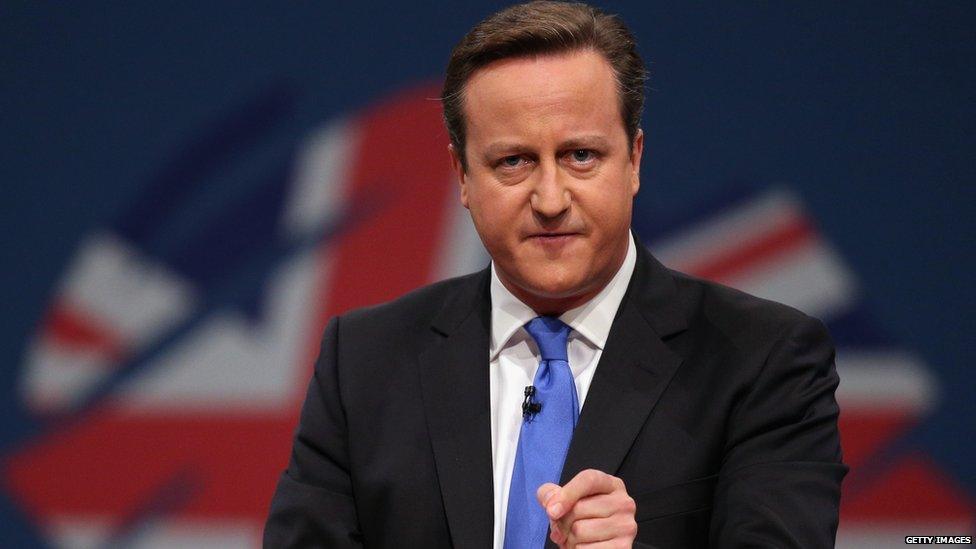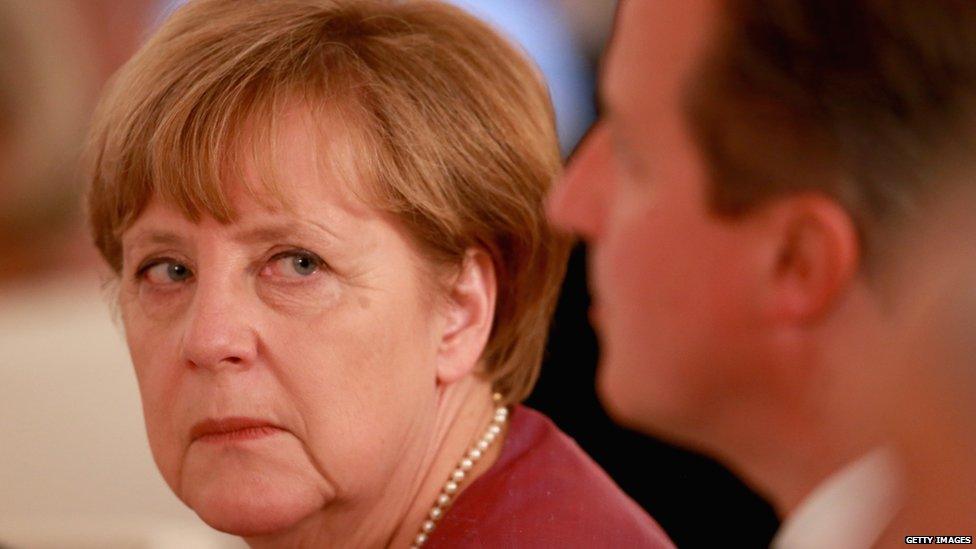What does David Cameron want?
- Published
- comments

David Cameron has promised an in/out referendum by the end of 2017
It'll be less of a fanfare and more a quick bugle blast but today, at a scheduled summit of EU leaders in Brussels, UK Prime Minister David Cameron will - for the first time - officially present the outlines of his reform proposals for the EU.
In fact, it's a mere formality.
Ahead of the summit, Mr Cameron has spoken to other EU leaders individually about his reform agenda.
He will need them on board if, as promised, he'll settle for nothing less than fundamental changes in the EU ahead of Britain holding an in/out referendum by the end of 2017.
So what is David Cameron asking for?
EU reform: How will Poland react to Cameron's plans?
In broad brush strokes he wants:
An opt-out on the core EU aim of "ever closer union" including boosting the sovereignty and powers of national parliaments, so groups of them can block proposed EU legislation
To safeguard the interests of the UK as a country and specifically of the City of London and other financial centres outside the eurozone
To curb internal EU immigration by cutting benefits
To make the EU more streamlined and competitive
Don't expect much more detail than that out of this summit.
The prime minister is careful not to give too much away in public. After all, this is a process of negotiation in Europe and of persuasion at home to convince eurosceptics that any deal he eventually gets was hard won and significant.
And what kind of reception can he expect from other EU leaders?
In Britain, discussion about Europe can frequently smack of "us and them" sentiment but watch and listen to David Cameron following his election victory last month. He literally oozes relaxed confidence.
In general. EU reform is no exception. And he is not wrong, for now.
Mainland Europeans, accustomed to laborious consensus politics (such as in Germany) or political theatre that's high in drama and all too often thin on results (like Italy) speak admiringly or even in awe about the UK and its combative parliament and no-nonsense way of getting things said and done.

German Chancellor Angela Merkel has said she wants the UK to stay in the EU
And David Cameron has just provided another stark example of this.
Complaining about the EU is commonplace across its member countries these days.
But the prime minister has simply declared "we want a different relationship with a reformed EU, otherwise we'll take a vote on whether to leave".
France could be a tough negotiating partner as the UK pushes for EU reforms, as Katya Adler reports
As we've travelled across Europe over the past few weeks and months, we've met a number of politicians - in Spain for example - who've expressed some exasperation at Mr Cameron calling an EU referendum. But my sneaking suspicion is that it's because those same politicians know their electorate want a better deal from the EU too.
There's a fear that if every country pushes for themselves, that could, potentially, lead to the unravelling of the European Union.
Germany calls it Pandora's Box. The Spanish expression is Opening the Melon.
French Economy Minister Emmanuel Macron blames Margaret Thatcher and her special EU deal, the rebate, for - as he put it - destroying the EU budget.
French economy minister, Emmanuel Macron: David Cameron must not be allowed to pick and choose which regulations Britain signs up to
"I've seen it myself at these meetings," he said. "Now everyone wants their own cheque."
He used a very determined tone when he insisted that Britain could not be allowed to "cherry pick". I've mentioned this here on the blog before, but I'll repeat it because it is so memorable, that the Germans call this stance "Extrawurst" or extra sausage.
Using a fabulous British expression now - David Cameron really has put the cat amongst the pigeons.
But rather than alienating or isolating the UK, many EU leaders are - and let me emphasise that this is before negotiations begin and potentially get dirty - lining up to say how much they want Britain to stay in the EU.
Now if I were cynical, I could say a lot of that has to do with the fear of losing one of the largest net contributors to the EU budget, one of only two decent sized and active military forces in the EU, with a permanent seat on the UN National Security Council, a pretty good relationship with the United States and a determination to stand up to Russia.
There is also genuine and widespread support amongst leaders for the prime minister's drive to make the EU more competitive, with a stronger single market and less bureaucracy.
But European smiles disappear when it comes to David Cameron's push to curb internal EU migration. He wants to put other EU members off coming to live and work in Britain by cutting their benefits.
Poland is furious. Hundreds of thousands of its countrymen and women live in Britain.
Will "wild card" Spain back Cameron's EU reforms?
Jacek Rostowski, Poland's former finance minister and chief adviser to the Polish prime minister until the recent political upheaval there, told me: "You can't discriminate between EU citizens in competition for jobs, just as you can't discriminate between EU citizens on EU territory in access to health services.
"Imagine if British people who retire in France or Spain had differential access to French and Spanish health services. That gives you some idea of what would happen if the boot was on the other foot."
Germany objects too. MP Michael Fuchs told me Mr Cameron's proposal tramples on the Freedom of Movement - one of the EU's core principles.
Spain's EU Minister, Inigo Mendez de Vigo, simply shook his head, insisting: "There are certain values, certain principles we all share - well, we cannot touch them, we shouldn't touch them - and we're not going to do it."
So where do we go from here?
His proposals formally submitted this evening during the summit, David Cameron hopes substantial negotiations and technical discussions can start in earnest.
The European Commission will be charged with working out whether his ideas, if accepted by fellow EU leaders, would need treaty change or not.
The prime minister admits the road ahead is a long one.
Yet his chosen timetable - to be done and dusted with the deal and the referendum by the end of 2017, many predict even sooner - is very short indeed.
In Brussels' terms, at least.